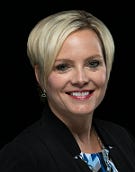Telarus CEO Projects 'VAR Implosion,' CenturyLink's Miller Gives Channel UpdateTelarus CEO Projects 'VAR Implosion,' CenturyLink's Miller Gives Channel Update
The fall of traditional VARs spells opportunity for innovative partners.

TELARUS PARTNER XCHANGE — The Telarus acquisition of CarrierSales is a reflection of industry-wide dynamics, according to Telarus CEO Adam Edwards.
Edwards explained to the Telarus Partner Xchange audience Wednesday that although many people long expected the two Utah-based master agents to come together, he needed more time to consider the possibility.

Telarus’ Adam Edwards
“[Telarus co-founder] Patrick [Oborn] saw it before me; [CarrierSales CEO] Richard [Murray] saw it before me; some of you saw it before me. But I don’t operate just by gut feeling,” Edwards said. “For me, I’ve got to study it out. I’ve got to understand the dynamics. I try to be systematic in my thinking, so I always habitually pause and assess what’s going on.”
Edwards said Telarus ultimately saw the need to increase its specialization. More and more companies in the channel — partners and vendors alike — are succeeding by making a particular technology, product set or vertical their bread-and-butter. Trust is important, but expertise has become an equally important layer.
One of Telarus’ specializations was network and automated pricing.
“I don’t think anyone questions if Telarus has an expertise when it comes to wireline services,”Edwards said. “But we made a big push into UC.”
Executive Vice President Richard Blohm came from the VXsuite that Telarus acquired, and he advocated that CarrierSales could add value to the team. CarrierSales had deep knowledge in contact center, mobility and IoT.
“What we found is some of our most trusted partners – partners who trusted us – would walk their deals down the street because CarrierSales had expertise,” Edwards said.
Edwards says a merger with CarrierSales wasn’t on radar in previous years. But Telarus found that CarrierSales brought specialized contact center, mobility and #IoT expertise.#TelarusPX pic.twitter.com/fFA4BQVXdb
— James Anderson (@JamesAndersonCP) June 20, 2018
Product expansion is major trend in the channel, as reflected in some of Telarus’ earnings.
Contact center and UC increased 120 percent year-over-year for Telarus. SD-WAN increased by an astounding factor of 40.
.@telarus’ year-over-year sales growth. Contact center and unified communications with a large increase, and #SDWAN really skyrocketed. #TelarusPXpic.twitter.com/8HjI3rq5fN
— James Anderson (@JamesAndersonCP) June 20, 2018
Edwards also spoke about his company’s planned expansion into Australia and New Zealand. The Ocean unit, which Telarus announced in April, will have an office in Sydney and look to mimic the growth Telarus has seen in the U.S. The expansion is still in development, but certain suppliers have already established a deal pipeline with Telarus, according to Edwards.
“We decided to dip our toe into the water and try Australia and see if the same dynamics work. Well, turns out it’s working phenomenally well,” he said. “The prospective partners we talked to there are excited about the opportunity. They see what you’re seeing, and we haven’t even launched yet.”
Edwards made five predictions about people have been expecting to happen in the channel in the upcoming years. First, opportunities are getting bigger, and agents are having a bigger hand in them. Second, agencies are growing and making it easier for partners to scale. Third, specialization will increase as indicated by the Telarus-CarrierSales deal. Fourth, increased expertise will lead to increased automation. Finally, we should expect more M&A.
But then there’s the “unexpected,” which Edwards said will lead to the best opportunities.
There’s the economic downturn, which we saw in 2008. It was a terrible time for many companies, but it actually lead to…… major innovation for others, according to Edwards. Talent becomes more available, and the products and services that increase efficiency become kingmakers.
Take cloud, for example. The recession forced businesses to get away from capital investments.
“You may have thought that cloud was inevitable. Of course it was going to happen. We tried it in the ’90s with application service providers…The fact is in ’08 is when it accelerated,” Edwards said.
The other two unexpected trends are big data and artificial intelligence, and what Edwards calls a “VAR implosion.”
Edwards said a few years ago, the IT distributors he spoke to were projecting 30 percent of their VARs to fall off the map.
“They’re just not making the shift; they’re not moving to cloud; they’re not getting retrained or retooled. Now the number I’m hearing is 60 percent,” he said. “If that’s not implosion, I don’t know what is. There’s a vacuum being created in third party advisory — a vacuum that you’re about to fill.”
Lisa Miller, CenturyLink’s president of wholesale, indirect channels and alliances, gave a data-filled keynote after Edwards.
Miller said her views on the channel have transformed to immensely positive as partners have moved away from “transactional” dealings. And in an increasingly global market, many large vendors view a partner program as not just preferred, but “necessary.”

CenturyLink’s Lisa Miller
“When we look at quarter-over-quarter growth that we show for enterprise sales growth, the indirect channel’s growth is higher than what we’re seeing in our direct channel,” Miller said. “That is a key factor for all of us to understand. Because of that big, enormous market, there is so much value in the partner community.”
And no good channel trends keynote is complete without talking about the next generation. Miller said more channel partner owners are retiring than stepping into the fold. She asked audience members if they are actively hiring millennials, who approach tech buying in a vastly different manner.
“We need to realize, in less than six years the lion’s share of the people at this table are going to be millennials, and they make decisions differently,” she said.
Read more about:
AgentsAbout the Author
You May Also Like


